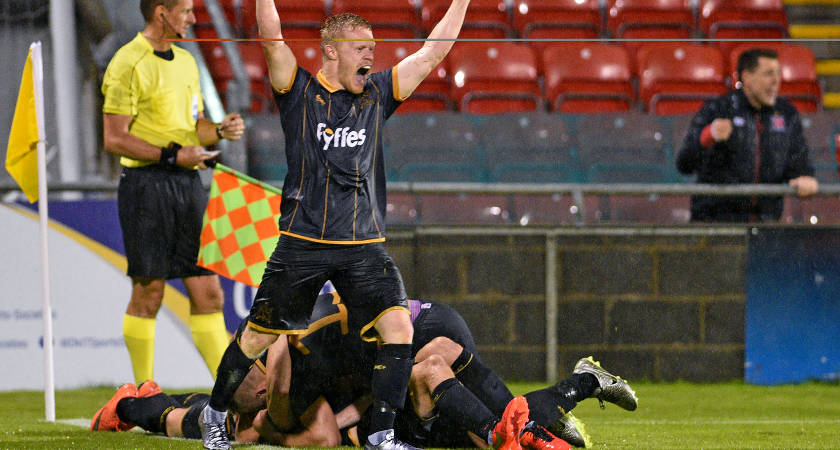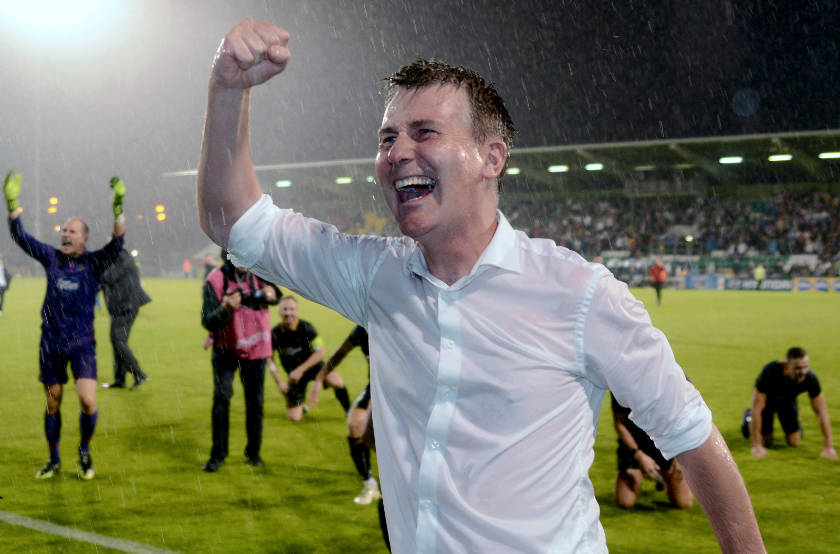IT was getting close to midnight when the unlikeliest of heroes made their way out of Tallaght Stadium.
Night had fallen and so had BATE Borisov, perennial qualifiers for the Champions League group stages, a club who work off a €15m annual budget but one who had been humbled by a group of underdogs whose rundown stadium was in such bad nick that they were forced to move their home tie 60 miles south to Dublin.
If this was a source of annoyance, then it didn’t show on the park. A 3-0 win was arguably the greatest ever by an Irish club in European competition.
Certainly it was the most lucrative. Having pocketed €1.2m in prize money just by reaching this stage of the competition, their income is multiplying with every victory. Now guaranteed €6m on the back of their European adventure, that sum could increase to (at the very least) €14m if they see off Polish side Legia Warsaw in their Champions League play-off.
So they dare to dream. No Irish club has ever reached the group stages of world football’s most lucrative competition. Yet if it is going to happen at any stage in the next decade then now is the time.
“We have put ourselves in an absolutely unbelievable position to go on and create history,” said Daryl Horgan, their winger and best player.
 Horgan celebrates at full-time ©INPHO/Ciaran Culligan
Horgan celebrates at full-time ©INPHO/Ciaran Culligan“We’re just after knocking out a team who have been group stage regulars, a team who were unlucky last year not to make it to the last 16, after being placed in a disgustingly difficult group. When you knock a side like that out, it gives you confidence. We are a very, very good side and we showed that quality last Tuesday.”
They certainly did. After riding their luck for 20 minutes, they then rode the crest of a sporting wave, responding to the noise and passion of their supporters to defy logic and the Belarussians to overturn a 1-0 first leg deficit.
And as they celebrated afterwards, soaking up the adulation of the crowd, it suddenly became clear to all of us there that this wasn’t just a victory for a football team.
It cut so much deeper than that, invoking memories of what Ireland did to Italy in Lille and what Leicester City did in the Premier League last year.
No player at this club earns a fortune. We’re all just young men trying to improve. We’re grafters. But everything, all the sacrifices, and there have been a lot of those at times, is now worth it. When you dedicate yourself to sport, you miss a lot of nights out, you miss a lot of birthdays.
I haven’t been back home (Galway) since April. It can be tricky at times. The gaffer expects a lot, but we expect a lot ourselves. Whoever is not working hard can be spotted a mile away – and they’re pulled on it, not by the boss but by us.
And that is what the group has been, a great group of people who have worked incredibly hard. The gaffer is full-time but his backroom staff aren’t. They’ve full-time jobs, kids, yet they put in serious hours.
And it is all worth it. For me, anyway, I’m privileged to have the job I have. Lads are clocking into factories every day, nine to five, working to live. I’m living to work because I love this job. The runs on January nights are not nice but you did those runs because you dreamed of nights like this.
Daryl Horgan
Yet the dream he is living is not one you might imagine. He lives in a semi-detached house in Dundalk, sharing the rent with two other players from the club, relieved that his 42-week-per-year contract is now extended until December.
As Patrick McEleney, his team mate, so aptly put it: “Qualifying for the Europa League means I can afford to buy nappies for the child at Christmas.”
And yet even though the additional money the club have earned is important – with a built-in bonus structure inserted in the players’ contracts – this has never been about euros and cents for Horgan. It’s been about something deeper than that; his search for respect.
“The League of Ireland is knocked a lot, so nights like last Tuesday prove that it is not a joke, not a laughing matter, not a thing to be pushed aside. To have a big meeting (his reference to the FAI’s AGM) where it ends with a statement about clubs in the league being given €100,000 over five years is a shambles.
“That sort of thing would be laughed off in any other country. So our win was not just for us, and not just about us. It was about all the volunteers at every club in the League of Ireland.
“Hopefully we will get that respect. It is not insurmountable for any club to achieve what we have. Our club was on its knees four years ago.”
 Dundalk boss Stephen Kenny celebrates the BATE win after the game ©INPHO/Ciaran Culligan
Dundalk boss Stephen Kenny celebrates the BATE win after the game ©INPHO/Ciaran CulliganThat it isn’t there any longer comes down to Stephen Kenny, whose managerial nous has led their revolution. “He’s such a positive man,” Horgan said. “When I first met him, I felt straight away that Dundalk was the place for me to go to. I remember losing 4-0 to them when I was at Cork and my dad said to me afterwards, ‘if they come in for you, go there. That club is going places’.
So is Horgan.
While the league may have a bad reputation, it has also proven to be the Launchpad for several careers: Wes Hoolahan, Shane Long, James McClean, Seamus Coleman, Kevin Doyle, David Forde and David Meyler.
And if you were to put your money on anyone to be the next League of Ireland graduate to make it in international football, it would be this guy, a winger who is blessed with pace, superb technique and an iron-clad belief.
“It (representing Ireland) is something that I would like to think could happen while playing for Dundalk," Horgan said.
"There was the issue that you would probably have to go to England to get in an Irish squad but we have proved we can compare with the best. BATE Borisov’s team is filled with internationals. They’ve played in the Champions League in four of the last five years. So you’d like to think there is an opportunity for us now. It hasn’t happened for a long time but you’d hope a player from the League of Ireland would merit a call up, and not just for a Mickey Mouse friendly, but for a qualifier. We don’t know if we are at that level but after last Tuesday, perhaps we are.”

